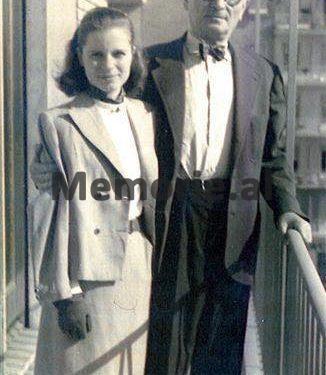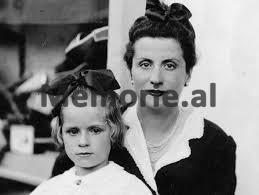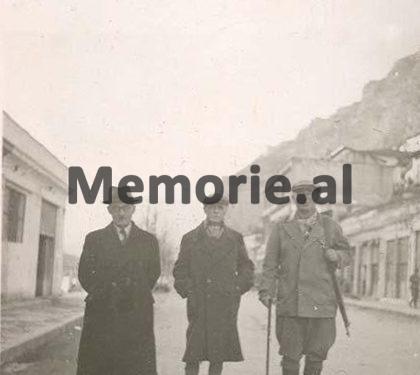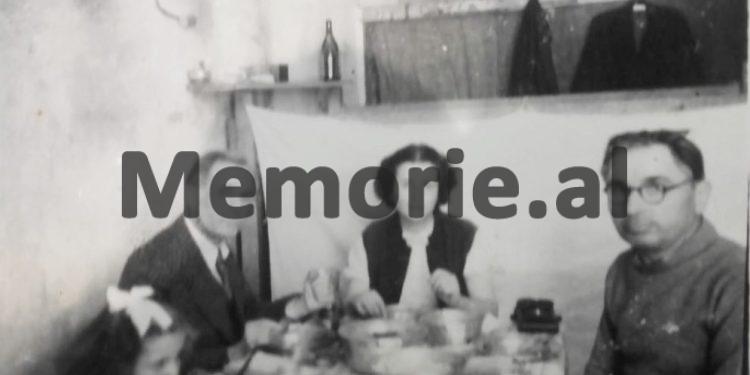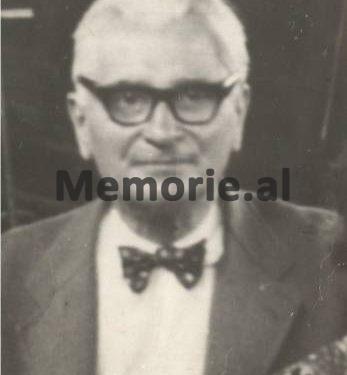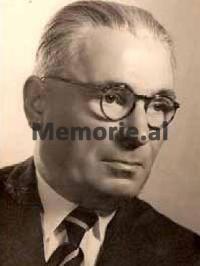By Ani Jaupaj
The first part
Memorie.al / The daughter of Ali Këlcyra, sentenced to death three times by the government of King Zog and by the dictatorship of Enver Hoxha, one of the founders of the “National Front”, tells about her life and that of her family. Since the birth in Paris, the constant journeys from one country to another, the ties with her father and the worry that she did not manage to create a family of her own. On the road, Hana walks alongside Këlcyra, she apologizes for not being able to walk on the right side. “Excuse me, why do the little ones always have to sit on the left side when the second one walks, but I’ve been used to it since I was little and I can’t change it.”
More than an instinctive habit, I didn’t know how to explain it all, but Hana had it. “When I was little and I walked with my father on the street, I was always on his left side. Because he was threatened with death, he always wanted to have his right side, and thus his right hand, free. There are few years that I have walked by his side, compared to the rest of my life, but I haven’t been able to change it.”
Sports clothes, accessories, hairstyle and all the sensations, completely different from her peers, make Hana Këlcyra, never give her the 75 years she counts, since the day of her birth. Of course, the reason for this is her way of life.
Constant movements around the world, living all these years in Vienna, where he still lives. However, being away from Albania, for almost all her life, learning several foreign languages, has not affected the old Albanian that Hana speaks.
Here and there he needs to remember a word or pronounce it in Italian and French, but the whole language is the old one, which almost no one speaks anymore. Hana (pronounced Hëna in Southern Albania), as was the first name of Ali Bey Këlcyra’s daughter, has returned to Albania after more than 60 years, so that language work is not a very simple thing.
Her childhood was divided between Paris, Kilcyra, Egypt and Rome, places where her father emigrated to escape the danger threatened by some governments. In this interview, for which we talked with Hana for a long time, we learned diagonally about almost her entire life and a good part of her father.
Starting from the first time when a child is “capable” of storing blurry images in memory, to the later memory that Hana has still kept so sharp that she is able to recount even the details of the events. Before entering the history inside, let’s first learn what the “Covenant” was, one of the key points for which the name of Ali Këlcyra was mentioned.
Hana tells: “Mithat Frashëri and Ali Këlcyra were exiled by the British, because they did not cooperate with the liberators (1945, in Italy). Ironically, Ali Këlcyra spent another 5 months in prison as an anti-Italian and as a participant in the Vlora War in 1920. After his release, he sought to unite all the political currents of emigration to overthrow the Tirana regime (year 1946).
Since until this historical moment the person of the father was considered by the leaders of the Albanian emigration outside the homeland, as an obstacle (taking into account his political activity, as an opponent of the King), he said: Since the national interest, the survival of the homeland was a priority for him, he joined the “Besëlidhja” association, which was able to materialize with the exception of Abaz Ermenji, who refused cooperation.
As a good speaker of the Greek language, Ali Këlcyra was commissioned by “Besëlidhja” to enter into an agreement with the government of Athens, to enable the entry of Albanian anti-communist troops into Albania from the land side, asking for a guarantee from the Greek side that they will not intervened after them in Albania militarily. The requested support was rejected by the right-wing Greek government of the time.
The Greek representative said: “It is better for us to have a communist government in Albania, rather than a democratic one, with you in the composition. One day the communist government of Tirana will fall and then it will be possible for us to enter Albania without a war”.
With this failure of Ali Këlcyra’s mission in Athens, the “Covenant” ends because, personally, Ali Këlcyra was against the landing with parachutes, for which the Americans would help, given the difficulties of concrete actions, the possible bloodshed and saving the lives of many innocent people.
But how did the story continue…? What were the highlights of his father’s political history, because of which the whole family was in danger? Why did she stay so many years without returning to her country after 90? Everything that happened and happens in her life, Hana tells in this exclusive interview that we are publishing in this article.
Ms. Hana, we continue the story where we left off…! What action did the father take after breaking the “Covenant”?
Ali Këlcyra returns to Italy and starts again the activity in the field of emigration journalism, publishing a newspaper with the financial help of the soldiers of the “National Front”. Later, he was elected to the “Free Albania” Committee (an organization supported by the USA to fight the communist dictatorship) and remained for years a member of the Albanian delegation that was appointed at the opening of the European Parliament in Strasbourg.
My father was an excellent orator, a skill that had been known to him since his youth when the first Albanian Parliament was created. His speeches that were recited without being read made an impression. This ability of his was even more appreciated by the public. There was what is called “tribune force”.
Meanwhile, he wrote articles and analyzes on topics about Albania, such as the role of women in Albania, the coming of communism to power, various historical wars, important moments in our history, etc.
The special feature of my father was for me, that he not only maintained and strengthened his contacts with his political opponents, but I cannot forget the evaluations that my father often gave of them, whom, although with opposing ideas, he called patriots, if they made contributions to dialogue in the interest of Albania.
As an example, we can mention the confrontations in Berat with Mehmet Shehu and others in 1942-1943, because the father wanted the Anti-Fascist War not to degenerate into fratricide between Albanians.
Without dissecting specific moments of history, let’s make a brief overview of the lives of the two…! What is the history of the name? Somewhere you have Hëna Këlcyra, somewhere else Hana Klissura?
The old, historical origin of the Këlcyra family derives from the Muzakaj family. As for the transformation of the surname, the transformation was made due to the title that the King of Naples, in 1272, had recognized Andrea Muzaka, the title “Conte di Clissania”, which geographically belonged to Gryka e Këlcyra (clausura, in Latin do means ‘closure’).
With the passage of time, this name is transformed into ‘clissura’, which can also be observed on the old maps of the time. With the arrival of the Ottoman occupation, in the 14th century, the name of the city “Clissura” was once again transformed into “Kelcyra”.
At this time, the family, in order to survive, adapts to the new reality and changes religion, also changing the name of the head of the family, from Teodor Clissura, to Jakup Këlcyra.
What is the story of your birth in Paris, why were you born there?
With the overthrow of Mr. Fan Noli’s government, he left his homeland for Italy (year 1925) and then went to Vienna, where he stayed until the time of the assassination of King Zog at the city’s opera house. After the assassination, the authorities invite Albanian political immigrants to leave Vienna, which prompts my father to flee to Paris, where he settled until 1939. Therefore, I was born in Paris, in 1936.
How long did you live in Paris?
At the age of 3 and a half, we returned to Albania with my parents.
Can you remember anything from your first arrival in your homeland?
We returned to Albania in 1939 from Paris and through Italy, we arrived in Brindisi. Then to Saranda, with a trip that lasted about 10 days. I remember first the impression that the round windows of the steamer made on me, then the darkness we found in Këlcyra, because there was no electricity.
The candlesticks held by the service personnel in the house of my paternal uncles were very tall, while I was very small, and this created a feeling of fear from the shadow they cast.
All through that first night, I felt fear. Then in the morning, the first sight I saw from the window of my pink room was that of the old family barns: everything was imprinted in my memory and from that day I remember everything.
Your return to Albania coincides with the time of the Italian invasion… Why did you return exactly then?
During the fascist period, the father found it impossible to enter Italy, as he, as a “social-democrat”, collaborated with the cream of the Italian social-democracy, especially with its historical figures, such as; Pietro Nenni, former President Saragatt, etc., also contributing his anti-fascist writings from Paris. After April 7, the father was in a dilemma whether he should continue in exile as an opponent of fascism or return to his homeland.
He made the decision after contacting the British colonel, Hill (nicknamed Albania’s friend), who advised him to return: “You fought the royal government for so long and you didn’t achieve your goal from the outside. Resistance is only possible if it is done from within. If you are going to contribute to the resistance to the occupation, you should go back to your people.” With these words, his dilemma to return was clarified.
Ali Këlcyra was one of the first deputies of the Albanian Parliament. How did he first enter politics?
The first relations with politics were due to his education and knowledge of the French language. Made the first speech in French to Queen Sophie (wife of King Wied), since she did not know Albanian (1913).
Let’s go back to Këlcyra, the place that after more than half a century has recently brought you back to Albania several times. What are the first memories there?
After two weeks of being in Albania near the family, with the reason of a ‘familiarization tour’ of the country for the mother, who did not know the country very well, the father and mother visit most of the southern cities, up to Elbasan and Tirana, making contacts the first with his friends and other important personalities of the time, in order to create an anti-fascist organization.
In those 6 months that I lived there without my parents, the connection with Këlcyra became so strong and it was never broken. If we take a car and go there now, you will realize that I am no longer the man I was a few hours ago. I can’t forget the picnics I used to have with my “brother” the “donkey”.
This story of the brother is funny, because that’s what I called the donkey that was born in Këlcyre, at the same hour and on the same day, that I was born in Paris (life shows us that sometimes the animal can turn into your brother ).
Walking in the villages, I was welcomed everywhere at the tables of the peasants of the surrounding villages and I enjoyed it a lot, even though in the protocol of our house, this was very common. At our tables you should not usually laugh, raise your voice and put your elbows on the table.
All this for a child was annoying, unwanted, that’s why I enjoyed the freedom I enjoyed in the houses of the peasants, even though their best dishes could be soups with white trahana, onions, buttermilk, or bread and corn.
Another interesting memory is that many old women of the village cried every time they met me. After asking; “grandfather” (that’s how I used to call my uncle, Muhamet bey Këlcyrës), tells me that the reason for the tears was because I had not given birth to a son.
I emphasize that the “fireplace” of Këlcyra was in danger of being extinguished due to the lack of boys. So, one fine day, I went to the barber and cut my hair short so that it wouldn’t cry anymore, because I already felt like a boy.
What was it like when my father returned, because the time of the Italian-Greek war had come…?!
In the evening, before the declaration of war with Greece, the Italian authorities request the cooperation of the father against the Greeks, so by fighting against them, the father would be given the opportunity to take revenge for the burning of Sarajevo by the Greek army in 1914, when the uncle, Muhamet bey, refused to sign the recognition of the Greek-Albanian border, according to the Përmet-Këlcyre line.
The father refused to cooperate on this basis, because he believed above all in the good neighborliness established during the years of the Kingdom, while he saw the Italian intervention as unsuccessful.
Based on the knowledge he had about Greece and its history, the father says: “The Italian army is not prepared for such a military confrontation, as you still have the soldiers dressed in summer clothes. The Greek can sell everything, but not his country”, said the father to the Italian representatives.
He didn’t believe the Italians, who thought the war would only last 3 weeks, on the contrary…! At the beginning of the war, he sent me to Vlorë, on top of a truck, and from there, to Fier to my aunt.
What was the result of the refusal to cooperate?
His internment. I was present when the police car came and arrested him. When I saw that they handcuffed him, I lost all faith in him at that moment. Until that moment, I had considered my father as God, he was everything. From that day on, I never went to my father for any problem I might have.
Meanwhile, after his exile in Italy and our going there, the Italians burned our houses and shops (first they burned 7 and then 44 others), for which we were never compensated.
As you grew up, what happened to your education?
I learned to write and read in Italy, at the time when my father was exiled. Three months after his exile, we were allowed to settle in Italy, with my father, in Cortona (Arezzo), where I began to learn to read and write in the Italian language.
But in Italy, in this period, you didn’t stay long, so the lessons would continue in Albania…?
The lessons continue at home privately, with a teacher from Lunxëria, Mr. Lekdusha, as well as a Swiss governess, for the German language, whom I called ‘nani’ – a name that governesses are usually called in Northern Europe.
As for the Fringe language, I learned it with Mademoiselle Badel. Until the third grade, I gave the exams in the elementary school of Fier. I completed the first three months of the 4th grade privately in Shkodër, before our departure from the homeland, on November 22, 1944. Memorie.al
The next issue follows




